By Lek Perviz
Part eight
THE ODYSSEY OF INNOCENCE
To my brother Valentin, who for
47 years straight, endured the ideological storms
of communism, moreover separated from his wife,
a true Odyssey in the twentieth century.
Memorie.al / When you enter Skuraj and cross the Urdhaza stream, the mountain ascent begins, on the hill called of the Lekbibajs. You pass in a row the three mills known as Gjin Pjetri’s, which are built one after the other. You also pass Ndrec Pjetri’s two-story tower, Gjin’s younger brother, and then you come across a rocky ledge on which stands a complex of three stone buildings, the historic towers known as the towers of Gjin Pjetër Pervizi of Skuraj, leader of the Kurbin uprising. These buildings dominate the entire valley, which is formed by the confluence of the Mat and Fan rivers (a tributary of the Mat), up to Milot. Almost a fortress that protects and defends the area from the expeditions of foreign invading armies that could penetrate that gorge, until they encountered the wall of the Skuraj Mountains, where the towers we mentioned were built.
Valentin lived through all those emotions and tremors, and like all his other friends, he also waited for what could not be imagined, but what could happen. All those fellow sufferers, beloved friends and companions, whom a terrible force would come and take, separating them forever from the others, were more than brothers.
The despair was great for their disappearance in that barbaric way of execution, without knowing even a stale or empty reason. The word was now out that special courts would be created. At least the prisoners would have the “privilege” of being “officially” executed, with documents. Guljelm Deda had found a reason for humor.
“Now yes, a special court! A great honor! With a special execution! Where can you find that? Saint Peter opens the gate of Paradise immediately for special souls!”
One day two highlanders from the area bordering Yugoslavia were brought into Valentin’s room. One was tall, about 1.90 meters, with a well-built and muscular body, with a regular face that expressed a good and proud nature. While the other, a little shorter with a harsh face, which showed great ferocity. The first was named Gjergj Luli, and the other, Gjek Marashi.
Both from Kelmend, the main center of that mountain region. In the room was someone who knew them well, named Pjetër, who had seen them one day being interrogated in the prison office. He said they were two very brave and trustworthy men, who were rarely found in the present world.
They had fought with great bravery against the partisan forces, in an attempt not to let them enter the Highlands. When the communists came to power, they stayed in the mountains. After a few months, one day, the operational commander of the area, sent them a message that he had received an order from above, to intern their families and burn their houses. He gave them 48 hours to think about how to decide: either to surrender or to stay on the run. In the second case, the measures against their families would be severe.
So they had to decide. They, in order not to allow the internment of their families and the burning of their houses, decided to surrender on the condition that they would be executed, but no one would touch them with their hand, or with a finger. The partisan commander had immediately accepted the condition that no one would touch them with their hand. This is what they told their cellmates, adding:
“We are waiting to be executed. As for death, we will die with a clear conscience, for the salvation of our families and our homes.”
Will there still be such people in the world, with so much moral strength, with such tempered character and a self-sacrificing spirit?!
One day two police officers came, informing them that the director was asking for them in the office, for some questions. After a while a group of partisans went up, who held hands and began to dance and sing in the antechamber paved with planks. With those iron-studded shoes, imagine what a noise they made on the wooden floor?! They danced in a circle, like wild people from the African jungles, shouting according to the rhythm of an already famous fighting song:
“At the bridge… at the bridge… at the bridge in Drashovica… The cannon… the cannon… the cannon of Italy thunders…”! It was so deafening that the prisoners couldn’t hear each other. This is how they always acted when it was time to torture and beat the convicts, so that their screams would not be heard from the torture they were suffering.
After an hour the door opened and two human forms were thrown into the middle of the room, as if they were two bags of rags, so badly had they treated those two unfortunates, that not even their friends would recognize them. Unable to stand, they went to their places, on their hands and knees. That’s why those barbaric hordes had created all that noise, so that no one could hear their screams.
They had beaten them with sticks until they had laid them on the ground, as if they were dead. Only after a few days, they began to move a little. At one point, Gjeka approached Valentin, asking him if he could hear a song that was coming from outside. And in fact, a distant song was heard.
“That’s a sign by which a cousin of mine is telling me that tomorrow morning, they will execute us.”
When night fell, he asked Valentin to play a game of dominoes. Valentin called Professor Angjelin Saraçi and Gjon Harusha to join the game. They played until late at night, until Gjeka told his friends to forgive him that he wanted to sleep. Later he had gotten up and had spoken to Valentin:
“Look at Gjergj how he is in his sleep”! Gjergj, as he was lying down, looked all red and covered in sweat. Who knows what terrible dreams were tormenting him. Valentin wanted to rest, but he couldn’t close his eyes that night, because he had a great pain in one ear. Several times during the night, he had seen Gjeka getting up and asking to go to the bathroom, which was leaned against the surrounding wall. But in vain. Even if he had wings, he couldn’t have done anything, because on the terrace above, there were guards with automatic rifles in their hands.
They came and took them before dawn. When one of the guards read the names, they all stood up, to greet them for the last time. They hugged with tears in their eyes. Gjergj took off the beautifully knitted wool jacket he was wearing and gave it to Valentin, thanking him for lending it to him. The jacket was his, but as a good person that he was, he gave it to him in a way that the guards would not understand that he was leaving it as a memory and a legacy, because otherwise Valentin could have suffered mistreatment.
They had decided to execute them in a place near Shkodra, precisely in Koplik, where Llesh Marashi had fought against the partisan forces of Mehmet Shehu, in January 1945. Since it was not more than 7-8 kilometers away, they had taken them on foot, because a day before, all the partisans and residents in the area had been notified to come and see what “animals” they were.
The partisans were lined up on both sides of the road, all young partisan men and women, with ragged uniforms, shouting and cursing like crazy against those true heroes, who on their part did not remain silent, but answered them with a rich vocabulary of curses, addressed especially to the Bolshevik regime, and to those mad girls.
When they were taken to the place of execution, where all those people who knew the two of them had gathered, they were leaned against a wall, handcuffed. Gjeka had been shot and fallen with the first shots, while Gjergj had held him in his strong arms, until them both fell together, with their bodies riddled with bullets.
At the time of the Italian occupation, a magazine was published, in which more than once, Gjergj’s photograph was presented, as an exemplary prototype of the Albanian race, not only for his athletic body, but also for the beauty of his face, with regular and perfect features. But the communist system was against everything beautiful and noble, be it human dimensions or historical, cultural, and the best Albanian traditions. It was proving to be a completely anti-Albanian and anti-human system.
Two weeks did not pass and in Valentin’s cell, before the day broke; three others came and were taken away, candidates for execution. Among them, a villager named Hasan Bërdica. As soon as he heard his name, he stood up and got dressed. Then he turned to Valentin and the other friends:
“To tell the truth, I didn’t expect such an end. I don’t feel guilty of anything, because I haven’t done anything wrong to anyone. But as far as I understand, in my book, it’s God who has put the final word. Forgive me if I have upset you. See you in the next world”!
This was the usual greeting of all those sentenced to death. In the yard, six others were waiting for him, destined to die. They were accompanied by strong guards, to the place where they would join six others, brought from the old prison. They were put on a truck, tied two by two, with handcuffs. Hasani, who was left alone and last to get on the truck, with a quick movement broke away and ran. The partisans, armed to the teeth, were surprised, but immediately started shooting at him, a barrage of bullets.
But he, with dexterity, by going through the alleys, had escaped them. It was a miracle, because not a single bullet hit him, out of the hundreds that were fired at him. After this scene, the truck left and the other 12 victims were sacrificed to the communist idol, according to the macabre ritual that was performed almost every day, on the sand of the Kir. Among those executed, there were also two Catholic priests.
As for Hasan, Valentin had heard from other highlanders brought to prison, that after six months of staying in the mountains, the Persecution Forces had surrounded him in a cornfield, where a gunfight broke out and poor Hasan, after a fierce fight, was left dead.
One day when Gori came to meet Valentin as usual, he told him that some friends had advised him to write the biography of his whole life, until the day of his arrest, which would be addressed to Mehmet Shehu and a copy would be handed over to the director of the prison. Valentin got to work and managed to compile his autobiography.
Why should this be done, and why so urgently?!
A State Security agent had told a friend of his, who was a friend of the Pervizi family, that the special organs of the Security had the purpose of setting up a fabricated trial against Valentin, to condemn him severely and, perhaps, physically eliminate him. Of the many accusations made, one was completely ridiculous: Valentin was allegedly sent to Albania, by some political exponents in exile, of the Legality party. According to the accusation, Abaz Kupi and Mehdi Frashëri called him to Rome, to propose a special mission, that of going to Albania, t1o unites the nationalist forces, in the war against communism.
Valentin had allegedly accepted and as soon as he arrived in Albania, he had allegedly gone to Kelmend, Dukagjin and Mirdita, where he had allegedly participated in bloody fights, against the partisan forces, etc. With such an accusation, even if he had a hundred heads, they would have all been cut off.
Of course, Valentin could not help but be upset and afraid of those criminal methods of the communists. His situation was like that of Damocles, with the sword hanging over his head on a single thread. He never showed such tragic thoughts to Gori. While his fellow prisoners encouraged him. They did not believe that those fabrications would achieve their goal, because they were too ridiculous. But with such criminals, what can you not expect.
Prek Cali
Time passed and did not show good signs. The ferocity of the communists, instead of falling, was constantly increasing. One day in early March 1945, in Valentin’s cell, a tall mountaineer, two meters or more, handsome, with beautiful facial features and a pair of gray mustaches that suited him was brought in.
He was the famous Prek Cali, the pride of the Highlands and who was considered the prototype of the Illyrian-Albanian race. A patriot and brave fighter, and a wise man. Valentin had heard about him for a long time, and even more so, when he had stayed for a few months in Dukagjin, with his close friend, Lek Vojvoda or Vuksani.
Prek Cali happened to sit next to Valentin. They became friends quickly, because Preka had known his father and had worked with him. He had a good impression of him and admired him for his military skills and high-level training.
Despite the miserable condition they were in, Valentin and the prisoners had the opportunity to find out how it happened that Prek Cali, that man who was already a legend of the Highlands, surrendered and to whom?! Although the communists had taken power and the Germans had abandoned Albania, in Kelmend, the last fortress against Bolshevism, the resistance had continued under the leadership of Prek Cali.
One day, Valentin asked that proud highlander, with whom he sat side by side:
“But why did you surrender? Didn’t you know that it would be very difficult or impossible for an important man like you to get along with the communists”?!
“Yes, you are right,” Preka replied, “but there are some circumstances that brought me here.” And he had told what had happened to him. Other prisoners had also approached to hear the story of this famous highlander.
After the fighting had ended, against the much larger communist forces in terms of people and armaments, many of the brave men had stayed in the mountains, not to surrender. He mentioned those two highlanders, Gjeka and Gjergj, who were executed in Koplik.
He himself, with about ten brave young men, had managed to take refuge in a safe cave, on the top of a mountain, living like beasts. From time to time, one of them would go to get food supplies. This is how several months passed.
“Looking at those young men, my heart was constricted by the pain I felt for them, who had agreed to accompany me and even give their lives for me”!
One morning in mid-January, they realized that they were surrounded. How did the partisans find out?! Someone local, who knew the area well and where that cave was, must have brought them. The commander of that special unit had asked them to surrender. But they had answered with gunfire and the fight had continued for several days.
Meanwhile, the commander had spoken from afar in a loud voice:
“Oh Prek Cali, know that you are surrounded and you have no chance of salvation. Where and when can you find food, water and ammunition?! Therefore, your resistance is completely futile. I am telling you that; if you do not surrender, the authorities of the region have received orders to intern your families and burn your houses.
Prek Cali had intervened to persuade the commander to find a solution, so that the lives of those young men who were with him would be spared. He had told the commander to speak with Mehmet Shehu that they had decided to surrender, only into the hands of Mehmet Shehu. And Mehmet himself came there.
“If it were for me,” Prek Cali said there in that cell, “I would not have surrendered, until the last bullet, but in that cave I thought about the lives of those young men and for our families. When Mehmet Shehu came, I spoke to him from afar, telling him that we would surrender, if he gave us his word as men.
“He had replied, assuring us that he would spare our lives, and mine, then he addressed me:
“But why didn’t you join us, oh Prek Cali, and now you would be an honored man and a glorious hero with high decorations”?!
“I couldn’t join you, who were tied body and soul, with the scum of Serbia, against whom; we have been fighting for centuries.”
As for the last word, to spare my life, I was surprised and could not believe my ears, so I told him to repeat it one more time. He had repeated it. Then I asked him that no one should touch us, either on the way to Shkodra, or in the Security cells. He assured us of this as well. So we surrendered. They questioned us one by one, without touching us, and the boys were taken to the old prison, while I was brought here with you.”
“We congratulate you that they have spared your life,” Valentin told him and after him, the other prisoners.
“Of course, Mehmet Shehu has given me his word of honor and I don’t believe he will break it.” As a highlander, Preka was convinced that Mehmet would keep his word. Valentin and the others did not intervene so as not to burden him, but among them, they were convinced that Mehmet would not keep that word.
The surrender of Prek Cali had happened on January 15th. There in the prison, Preka was brought the first week of March. After two weeks, one early morning, before the day broke, noise and screams were heard in the corridor. The guards entering different cells were reading some names. The prisoners had gathered and covered themselves in their blankets, out of fear, while their hearts were beating fast. Whose turn was it now?! Quick steps were heard and after a while the cell door opened with a loud noise.
A black shadow of a police officer appeared there, who, with a kerosene lamp, illuminated a piece of paper that he was holding in his hand. What names would have been written on that crumpled paper?! And then, the police officer, after bringing the letter closer to his eyes, raised his head and called out in a loud voice, Prek Cali! In their cell, only that name echoed. Everyone was shocked. But for Preka himself, it was more terrible.
He never expected that Mehmet Shehu would break his word. As a highlander, he could not conceive of such a thing. But he forgot that Mehmet was not like the men of the highlands, who, when they gave their word, would keep it even at the cost of their lives. He was nothing but a bloodthirsty communist, thirsty for power, who did not care about breaking his word and not keeping his promise.
While they were saying goodbye for the last time, he said to Valentin in a whisper:
“What about the boys?”
“No, no, nothing will happen to them,” Valentin replied, to give him courage. Because Preka was very sad that the young men might also be executed. As he left, he called out:
“Forgive me, men! See you in the next world.”
In the corridor, there were nine other prisoners, handcuffed, and among them Dom Ndre Zadeja. They were all executed at Zalli i Kiri, which became the terror of Shkodra. It was March 25, the holy week of Easter.
How is it possible, Valentin used to say, that they always choose the best ones? Yes, until those moments, they had chosen only the best. Words cannot be found to describe all these crimes.
It was later learned that Prek Cali, the two Beltoja brothers, Dom Ndre Zadeja, and a priest from the old prison, had tried to give courage to their friends, until the last moment of the execution. Until when would this inherited and ordered genocide continue by the teacher and bloodthirsty criminal of the Kremlin, Josif Visarionoviç Stalin?!
The ideological war had begun and the tyrannical Albanian Zeus was at the head of the army of communist criminals, who had unleashed general terror against those who were considered not only opponents, but also honest men, patriots and who enjoyed the admiration, sympathy, and love of the people, for the good deeds they had done for the Homeland. Valentin was now included in these repressive measures, as a member of the good and innocent people.
He was realizing that he had to strengthen himself, mainly spiritually, to face the ferocity and drastic measures of the dictatorship, personified by the “Gods of Olympus” communists, who had their seat in Tirana, where the fate of the people they decided to eliminate was determined.
All this, to secure the armchairs or thrones on which they sat to reign forever, (according to them). How long would this situation last, only the true God knew (because false gods had been created). In any case, Valentin was now in the role of a “Ulysses”, who would be involved in those circumstances and who knows when, he would have the opportunity to return to his “Ithaca”, to his beloved “Penelope”?! Memorie.al




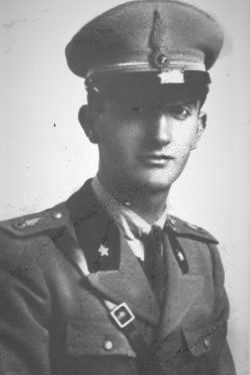
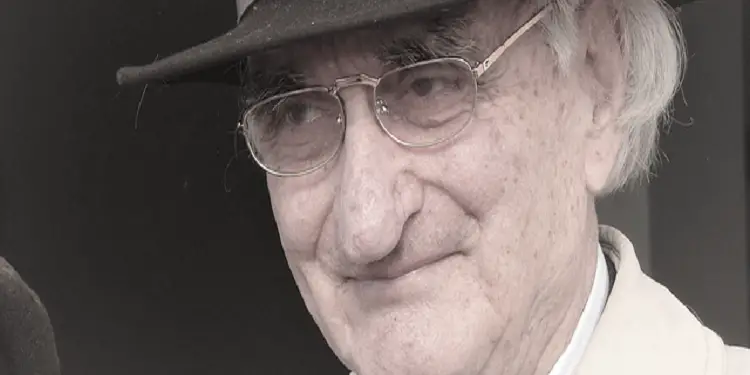
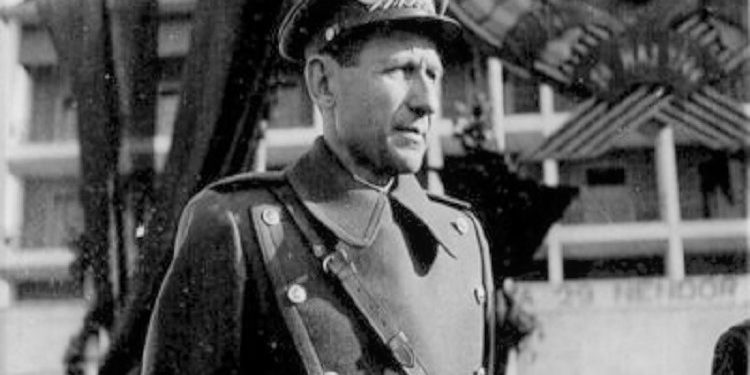
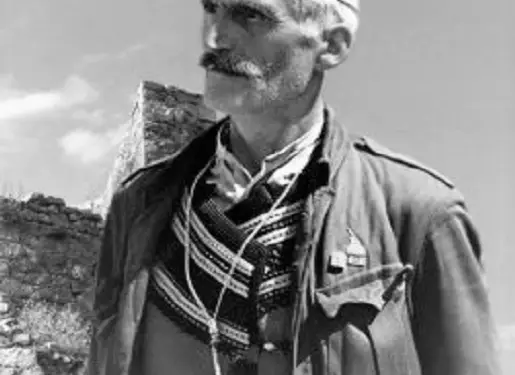
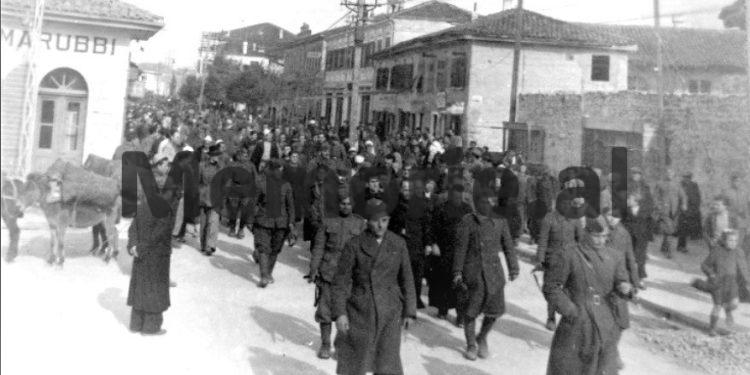
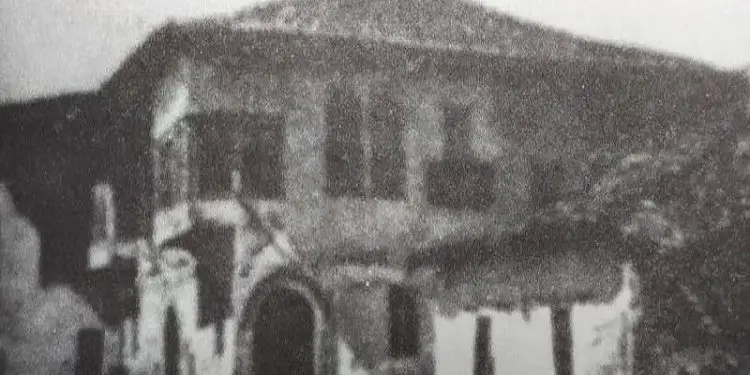
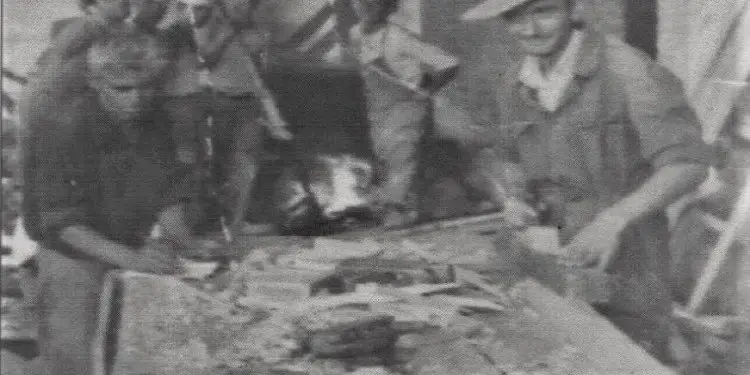



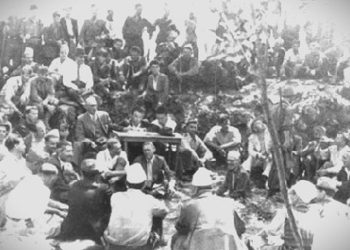
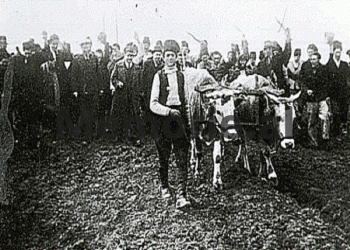
![“They have given her [the permission], but if possible, they should revoke it, as I believe it shouldn’t have been granted. I don’t know what she’s up to now…” / Enver Hoxha’s letter uncovered regarding a martyr’s mother seeking to visit Turkey.](https://memorie.al/wp-content/uploads/2026/01/Dok-1-350x250.jpg)
